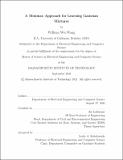A Minimax Approach for Learning Gaussian Mixtures
Author(s)
Wang, William Wei
DownloadThesis PDF (1.461Mb)
Advisor
Jadbabaie, Ali
Terms of use
Metadata
Show full item recordAbstract
Generative adversarial networks (GANs) learn the distribution of observed samples through a zero-sum game between two machine players, a generator and a discriminator. While GANs achieve great success in learning the complex distribution of image, sound, and text data, they perform suboptimally in learning multi-modal distributionlearning benchmarks including Gaussian mixture models (GMMs). In this thesis, we propose Generative Adversarial Training for Gaussian Mixture Models (GATGMM), a minimax GAN framework for learning GMMs. Motivated by optimal transport theory, we design the zero-sum game in GAT-GMM using a random linear generator and a softmax-based quadratic discriminator architecture, which leads to a non-convex concave minimax optimization problem. We show that a Gradient Descent Ascent (GDA) method converges to an approximate stationary minimax point of the GAT-GMM optimization problem. In the benchmark case of a mixture of two symmetric, well-separated Gaussians, we further show this stationary point recovers the true parameters of the underlying GMM. We discuss the application of the proposed GAT-GMM framework for learning GMMs in the distributed federated learning setting, where the widely-used expectation-maximization (EM) algorithm can incur great computational and communication costs. On the other hand, we show that GAT-GMM provides a scalable learning approach and a distributed GDA algorithm can still solve the GAT-GMM minimax problem without incurring extra computation costs. We numerically support our theoretical results by performing experiments which show that our minimax framework is successful in centralized learning tasks and can outperform standard EM-type algorithms in the federated setting.
Date issued
2021-09Department
Massachusetts Institute of Technology. Department of Electrical Engineering and Computer SciencePublisher
Massachusetts Institute of Technology